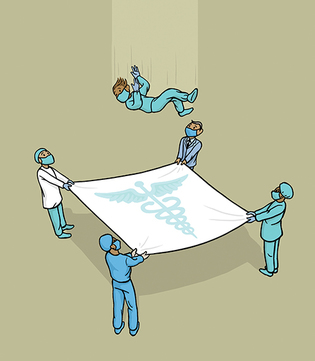
Gregory Nemec
Hospital emergency departments are fast-paced, demanding workplaces. However, the challenges for frontline emergency workers in the earliest days of the pandemic were different.
“Protocols for car accidents or cardiac events are high-intensity, time-
limited, focused interventions,” says Rohit Sangal ’21MBA, assistant professor of emergency medicine and associate medical director of the adult emergency department at Yale New Haven Hospital. But when COVID-19 hit, it brought uncertainty: about protective equipment, concern over infecting others, and constant new discoveries. It was a crisis with no discernible end.
Sangal contacted three of his School of Management professors to explore ways to offer support. The group structured a study to find out if workers who identify as part of a team are more resilient under high stress. From April to June 2020, researchers sent surveys via text to 431 frontline ED staff, asking about their levels of stress and their degree of team identification. The response rate was 76 percent. The results: workers who agreed strongly with the statement “I feel part of a team where I work” reported lower work-related stress and burnout. The study was published in BMJ Leader.
The surveys were compiled and delivered to ED leaders to help them improve the work environment. The workers also developed team-building activities. But the researchers stress that organizations must take concrete action to bolster team connection—such as a buddy system and keeping teams intact.
 loading
loading